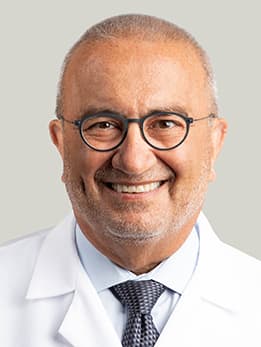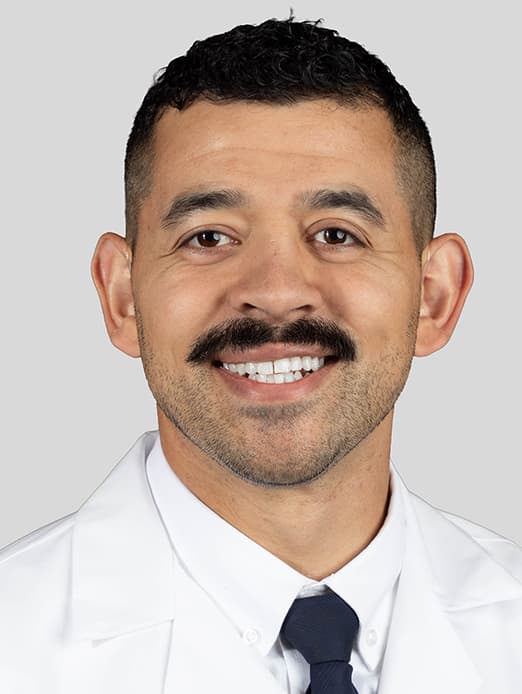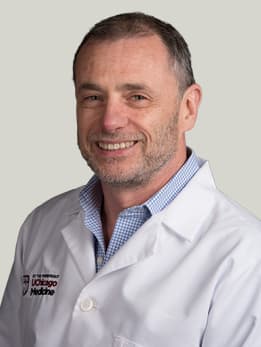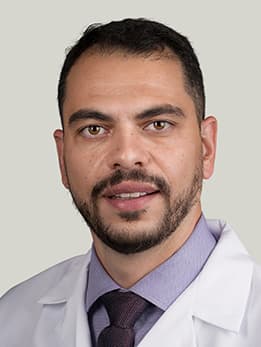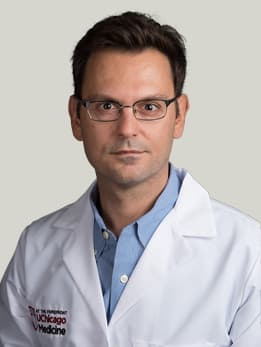Stroke and Neurovascular Care
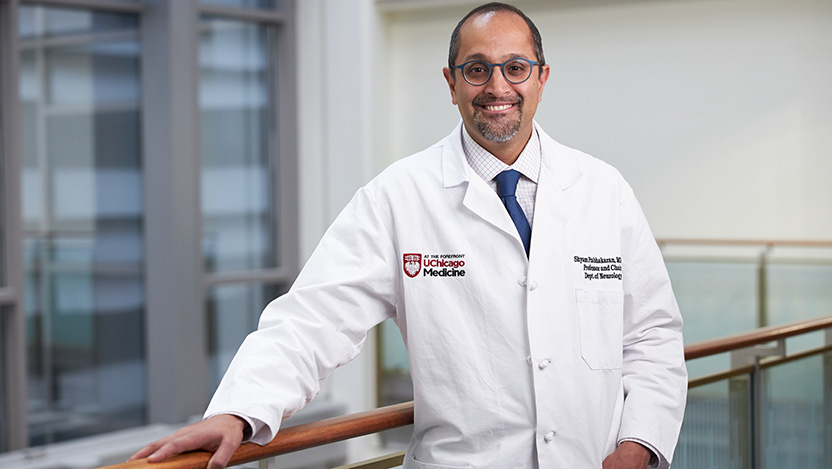
Multispecialty Stroke and Neurovascular Care
At the University of Chicago Medicine, our specialists provide the most contemporary, innovative care for the full range of common and complex stroke and neurovascular conditions. Our collaborative approach draws on the talents and internationally recognized expertise of leading clinicians in neurology, neurosurgery and neurointerventional surgery. Our team includes pioneering experts in these specialties, offering a depth and breadth of experience that enables us to help people with the most challenging stroke and neurovascular problems. Our team provides thorough and compassionate care at every level of illness and for patients at every age.
Heart-Brain Clinic
The UChicago Medicine Heart-Brain Clinic provides specialized treatment options and preventive care for patients with heart conditions that increase their risk of stroke.
Treatment for Stroke Conditions
Our team provides emergency care and treatment for stroke patients with the following emergent and less urgent neurovascular conditions:
- Acute stroke
- Arteriovenous malformations (AVM)
- Brain (cerebral) aneurysms
- Brain and spinal cord dural arteriovenous malformation/fistula
- Carotid surgery and cerebral revascularization
- Cerebral cavernous malformations(CCM)
- Cerebral venous sinus thrombosis
- Childhood stroke and pediatric neurovascular lesions
- Cryptogenic strokes
- Hereditary hemorrhagic telangiectasia (HHT)
- Intracerebral hemorrhage
- Pediatric vascular malformations
- Skull base tumors
- Subarachnoid hemorrhage and aneurysms
- Transiet ischemic attack (TIA or “mini stroke”)
Interdisciplinary Neurovascular Team, Comprehensive Expertise
Sometimes, there is more than one way to help patients with stroke or neurovascular problems. Our patients benefit from having experts in multiple specialties collaborating to customize care, based on each individual's medical problems, history, and life perspective. Patients will be able to see several specialists in one clinic visit.
Our physician team is led by specialists in:
- Stroke Neurology, offering the most state-of-the-art neurovascular guidance and care by stroke specialists in an award-winning Comprehensive Stroke Center
- Neurocritical Care, offering advanced monitoring and treatment in our state-of-the-art Neurosciences Critical Care Unit (NeuroICU), which is run by a multidisciplinary team of neurocritical care experts
- Neurovascular Surgery, providing expert diagnosis, management and surgical interventions
- Neurointerventional Surgery, performing state-of-the-art imaging and endovascular procedures for diagnosis and treatment
- Our stroke team is always available for rapid evaluation and treatment of stroke patients. UChicago Medicine is one of the few major medical centers in the region with an acute stroke care team that is available 24 hours a day, seven days a week.
- Our neurosurgeons have experience using several neurointerventional techniques to treat all types of stroke and neurovascular emergencies.
- UChicago Medicine offers a variety of stroke rehabilitative services. Our center was the first in Illinois to receive a three-year stroke specialty accreditation by the Commission on Accreditation of Rehabilitation Facilities (CARF).
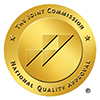
We strive to continuously improve the quality of care for our stroke patients. To maintain certification as a Comprehensive Stroke Center, our facility voluntarily undertakes a regular thorough evaluation by The Joint Commission. The Joint Commission is an independent, not-for-profit organization that certifies nearly 21,000 health care organizations and programs in the United States. Joint Commission accreditation and certification is recognized nationwide as a symbol of quality that reflects an organization’s commitment to meeting certain performance standards.
Achieving Joint Commission certification means that our staff has made an extra effort to review and improve the key areas that can affect the quality and safety of your care. Below you will find some of our key quality measures that are reviewed by the Joint Commission.
Our goal is to fully support patients along their entire journey from stroke to recovery, both while they’re in the hospital and after they have left. We provide the following resources to patients to make their transitions as seamless and safe as possible:
- Remote patient monitoring (RPM). Stroke patients are sent home with a tablet that provides stroke education and videos on how to appropriately conduct and track various screenings. The RPM device tracks the daily results of their blood pressure, depression and swallow screenings, as well as glucose levels for patients with diabetes. If the results of any of these tests are outside normal parameters, then a specialized nurse will follow up by phone to assess if any interventions are needed.
- Community health workers work with patients who are discharged to their homes and assist these patients with follow-up appointments and stroke education. They ensure patients are taking medications appropriately, monitoring their vital signs and using the remote patient monitoring tablet correctly. Community health workers also make sure each patient has access to food and a safe home environment.
- Population health care coordination nurses work with patients who are discharged to a post-acute rehabilitation center to ensure these patients have follow-up appointments with the appropriate providers and are receiving the care they need from their rehab facility.
| Measure | 2021 | 2022 | 2023 | Total Events |
Total Cases |
Percentage | |||
| CEA (Stroke or Death) | 1,26 | 0,18 | 0,16 | 1 | 60 | 1.7% | |||
| CAS (Stroke or Death) | 0,30 | 1,23 | 2,22 | 3 | 75 | 4% | |||
|
Diagnostic Neuroangiography |
0,130 | 1,135 | 0,143 | 1 | 408 | 0.2% | |||
| Aneurysm Clipping (Mortality) |
1,20 | 0,10 | 0,24 | 1 | 54 | 1.9% | |||
| Aneurysm Coiling (Mortality) |
4,34 | 3,47 | 6,73 | 13 | 154 | 8.4% | |||
| Subarachnoid Hemorrhage (Mortality) |
7,38 | 8,32 | 12,59 | 27 | 129 | 20.9% | |||
| Intracerebral Hemorrhage (Mortality) |
32,153 | 39,167 | 57,268 | 128 | 588 | 21.8% | |||
| Ischemic Stroke (Mortality) | 40,602 | 38,569 | 49,909 | 82 | 2,080 | 3.9% | |||
| Measure: Carotid Procedures |
2021 | 2022 | 2023 | Total Events |
Total Cases |
Percentage | |||
| Asymptomatic Carotid (Stroke or Death) |
1,30 | 1,20 | 0,16 | 2 | 66 | 3% | |||
| Symptomatic Carotid (Stroke or Death) |
0,26 | 0,21 | 2,22 | 2 | 69 | 2.9% | |||
Expedited patient transfer, urgent transfers and consultations
If you are a healthcare provider and wish to transfer a patient with a neurologic emergency or to speak with our team directly, call our dedicated NeuroICU transfer line at 1-773-839-4774 or 1-872-373-9535. Your call will be answered by an attending neuro-intensivist, addressing ischemic stroke, brain bleeding, status epilepticus, neurotrauma, hydrocephalus, tumors and other neurologic emergencies.
If requested, we will facilitate seamless transfer and make arrangements for bed assignment
To schedule a consultation for a less urgent neurovascular condition, call us at:
- Stroke Neurology: 773-645-4089
- Neurovascular Surgery: 773-352-2225
- Neurointerventional Surgery: 773-692-0287
- Neurocritical Care: 773-834-6742

